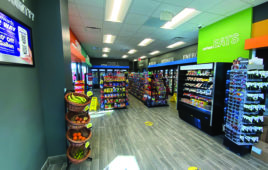Alot has changed on the credit card fee front since last year’s NACS/Convenience Store Decisions Webcast, but retailers are still faced with the daunting challenge of finding creative ways to bypass the high interchange fees that plague the c-store industry.
The industry’s efforts to battle these fees is getting attention, fostering the hope that real relief is in sight.
NACS President and CEO Hank Armour told CSD that over the past year alone, Congress held more than a dozen hearings dealing with credit card fees, four of which were specifically about interchange fees. MasterCard did an IPO to try and insulate themselves from go-forward antitrust liability and Visa has announced plans to do the same. MasterCard put a $75 cap on the amount of a transaction subject to interchange and Visa has recently changed some chargeback treatments in retailers’ favor.
"We’ve got a long way to go, but all of these things occurred because of the pressure that we are putting on them," Armour said, stressing the need for c-store owners to pressure elected officials and talk to reporters interested in this topic.
"The changes made as a result of our pressure have been positive, but it’s hardly where we would like to be a year from now or even six months from now," said Jeff Lenard, vice president of communications for NACS. "We are getting the word out and helping to rally the retail community to stick together and create positive change for our retail mempers."
For its part, NACS offers members its Credit Card Processing (CPP) program, which can save smaller chains thousands of dollars in processing costs, however, "it still doesn’t address the overall interchange problem," Lenard said.
Interchange Rates Remain
Key Concern
Though NACS has gotten concessions related to revealing rules and rates, the high interchange fees c-store owners pay when customers use non-proprietary credit cards remains the biggest problem. The only long-term solution is an overall interchange fees reduction.
Reducing interchange fees is complex. For one thing, card companies’ pricing grids have become huge and the kinds of cards customers use is so varied that it’s virtually impossible for retailers to know the fees they’ll have to pay on a given transaction.
For another, unlike Europe and Australia where governments restricts interchange fees to actual operating costs, the U.S. allows credit card companies to include their marketing costs in the interchange fees charged here.
"NACS Merchants Payments Coalition will have some success in the future, but it’s going to take time and, literally, an act of Congress to bring about real change," said Kwik Trip Controller Jeff Wrobel. "I think there will be progress, but it’s not going to happen overnight."
Until NACS wins its longstanding action against the credit card companies, the most significant step c-store owners can take is to try and wean customers away from using their credit cards—no small feat given U.S. consumers’ love of plastic and the high cost of gasoline which often exceeds the amount of cash most people carry in their wallets.
Kwik Trip is doing everything possible to make it easier and less expensive to accept other forms of payment and the measures it’s using have significantly reduced the number of sales requiring interchange fees to less than 35%, Wrobel said.
Unlike many chains, the La Crosse, Wis. operator of 384 stores throughout Wisconsin, Iowa and Minnesota, readily accepts checks, carefully putting in place protections that make taking them less risky by placing check readers in all of its stores and verifying checks against a negative database.
Even though Kwik Trip’s check volume is down a little bit, Wrobel said his company is still processing a lot of checks. A year ago the chain was averaging about 100 checks per store per day; the average now is still impressive at about 75. Wrobel noted that in some markets accepting 10 checks per day is a big deal, but that Midwesterners seem to use checks more.
Kwik Trip also offer a 100% proprietary card. "A lot of convenience stores have co-branded cards that still require paying interchange fees," Wrobel said. "Our card is significantly less expensive to process." Checks and proprietary card purchases constitute 25 to 30% of Kwik Trip’s overall payments volume.
Another bypass to interchange is simply cash. "We sometimes hear from people that it is also expensive to accept cash, which requires counting and depositing every day," Wrobel said. "But with fuel at $3 per gallon, that’s not true because credit has become so much more expensive."
Under Wrobel’s watch, the company is presently testing currency counting machines that could make cash handling more efficient.
Two-Tier Pricing Effective
Where state laws allow, selling gas at a cash price lower than a credit price is a workable interim strategy. "Florida allows two-tier pricing, so many operators are starting to offer gas at cash prices five or six cents less than credit card price," said Jim Smith, President of the Florida Petroleum Marketers and Convenience Store Association (FPMCSA).
New Jersey, one of only two states—Oregon is the other—that has a ban on self-service fuel sales, is another state where two-tier pricing has been effective.
One of FPMCSA’s more innovative members is Bill McKnight, president of Automated Petroleum, a company that like Kwik Trip is looking to convert credit customers to cash or proprietary credit card customers. Automated, which has 198 commissioned partners at stations it owns or leases to long-term, sells Chevron, BP, Citgo and Sunoco at four cents less per gallon to consumers using proprietary cards.
"We’ve been pretty successful at converting customers to use proprietary cards," McKnight said, adding that sales have risen from 30 to 34% on proprietary Chevron cards and stand at about 26 to 27% on Sunoco and BP cards.
"It’s a slow process, and it’s really up to the people who work in the stores to get customers to switch to using our cards," McKnight said. "But when store managers and employees work at it, they can do a great job."
McKnight has used outside training programs offered by Chevron and BP to make employee conversion efforts more successful. Last December, the company ran a highly effective promotion that gave 25 cents off for getting a proprietary card at five of its stations in Ocala, Fla.
Greg Parker, president and CEO of The Parker Cos. and vice president of research and development for NACS, also works at getting consumers to use major oil company proprietary cards. But the bigger issue, Parker said, is not what retailers can do individually.
"The reality is that you’re shooting at an elephant with a BB gun," Parker says. "We need to consolidate our resources and fight it through the Merchant Payments Coalition. We’re winning this battle, but we can’t win it without funds."




